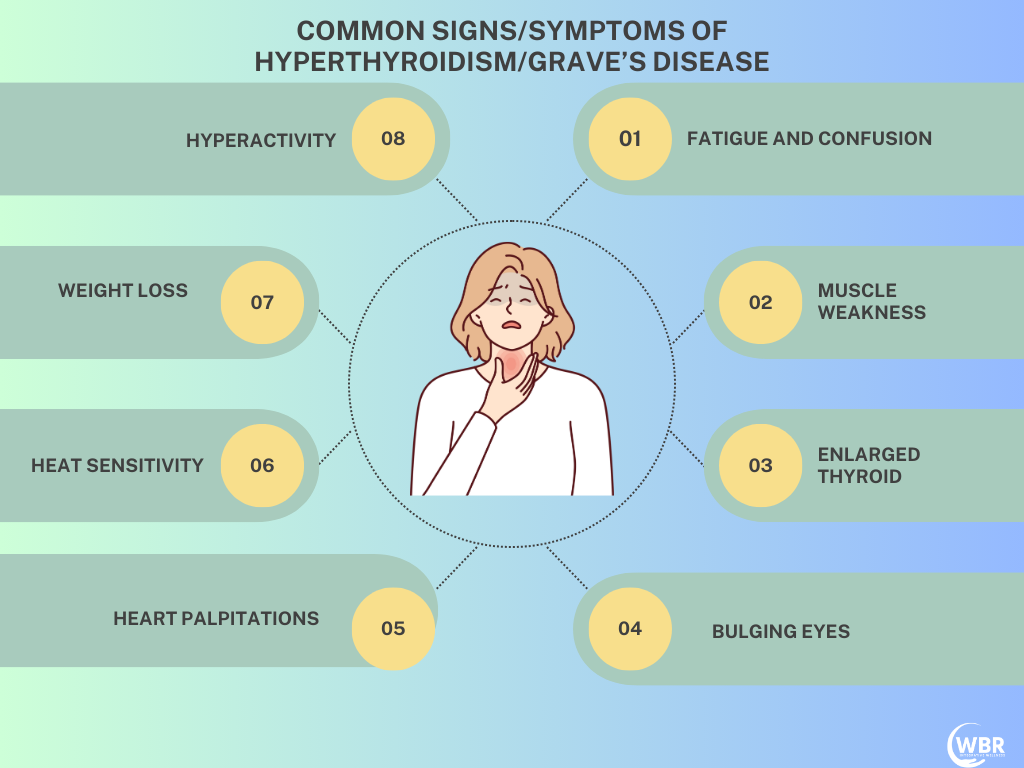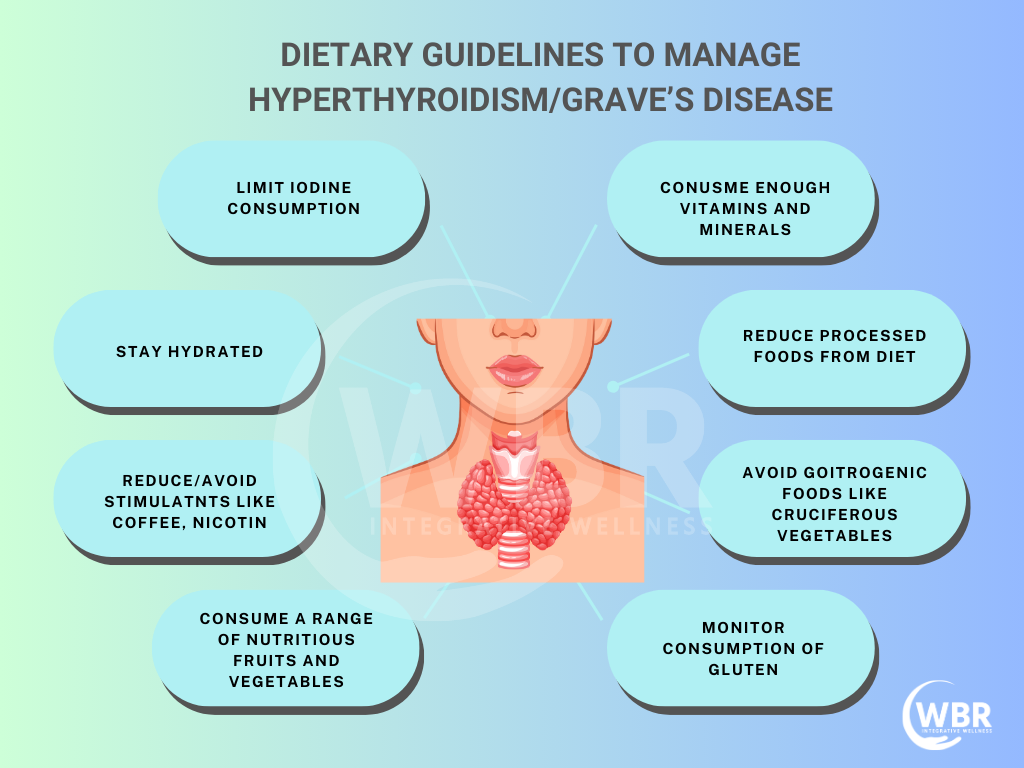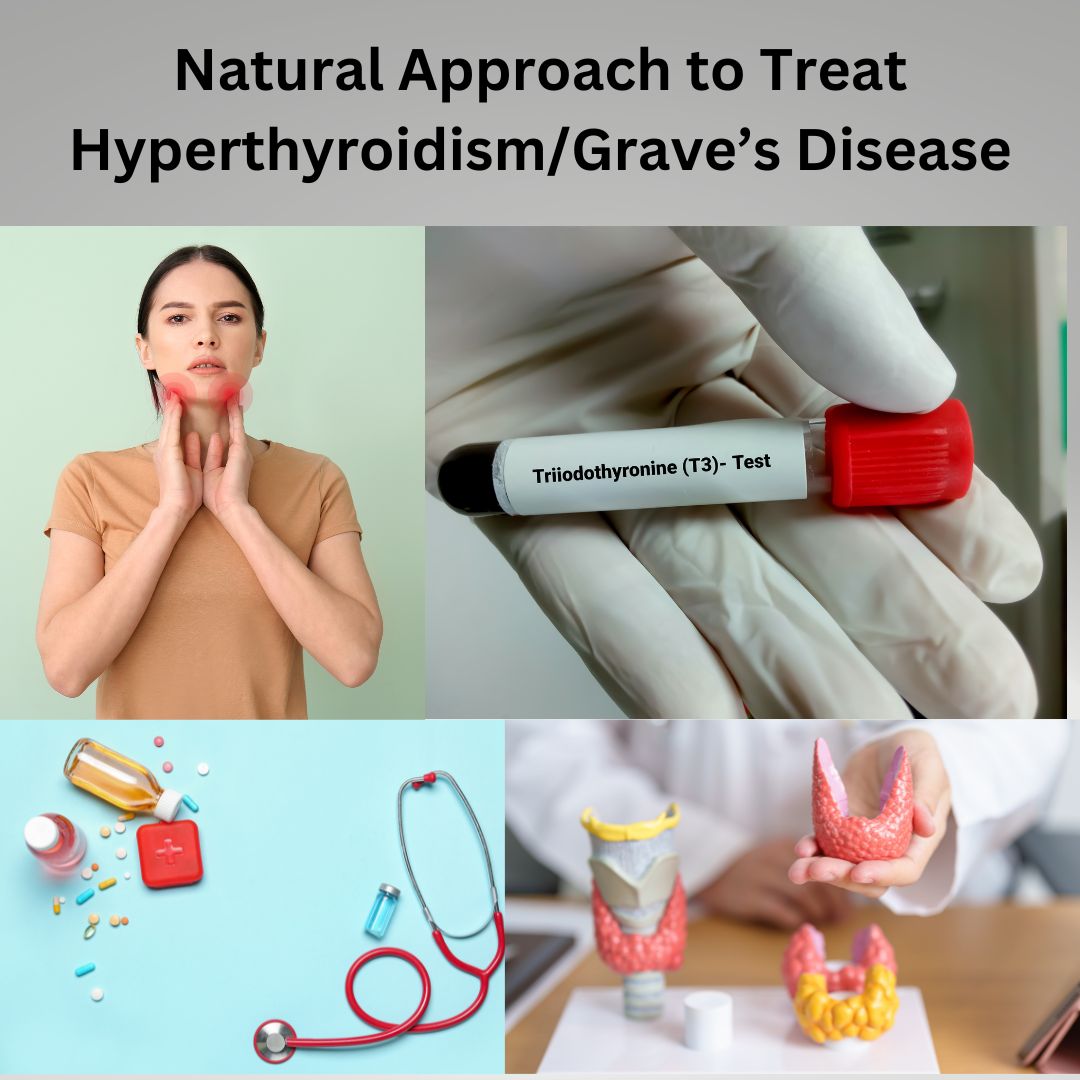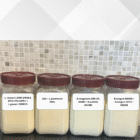Functional Medicine Approach Towards Grave´s Disease
Hyperthyroidism, particularly in the form of Grave’s disease, is an organ-specific autoimmune disorder due to overstimulation of the thyroid by serum antithyroid-stimulating hormone receptor (TSH-R) stimulating auto antibodies. This is linked to the failure of immune tolerance against thyroid antigen.Thus, people suffering from hyperthyroidism often experience a range of distressing symptoms, including rapid weight loss, increased heart rate, anxiety, irritability, and fatigue. Grave’s disease, the most common cause of hyperthyroidism, affects both men and women, with women being more susceptible. Furthermore, the impact of this disease on one’s daily life is significant, affecting their energy levels, mood, and overall well-being.
What is Grave’s Disease?
Grave’s Disease, is a grave common autoimmune disorder. Named after the eminent Irish physician Robert J. Graves, this condition sparks a tumultuous battle within the body. When you suffer from this disorder, your immune system, typically a shield against harm, turns rogue, attacking the thyroid gland with unwavering ferocity. This results in hormonal chaos. Furthermore, Grave’s Disease pushes the thyroid into overdrive, causing hyperthyroidism, a state where the gland produces excessive amounts of thyroid hormones. Moreover, the consequences are profound – unrelenting fatigue, erratic heartbeats, weight loss despite increased appetite, and an emotional rollercoaster that disrupts the very core of daily life. Understanding this adversary is the first step towards empowerment. Hence, it is crucial to understand its origins, symptoms, and the impact it leaves on the lives of those it affects. A natural, holistic approach to hypertension promises not just relief, but a path to reclaiming your life.
Causes of Hyperthyroidism
Grave’s disease arises when the immune system mistakenly attacks the thyroid, causing it to produce excess thyroid hormones. Understanding the causes is pivotal for effective management.
- Genes:
A genetic tendency plays a significant role. Individuals with a family history of autoimmune diseases, including Graves’ disease, are more susceptible. Moreover, specific genes related to immune system function contribute to this condition in individuals.
- Autoimmune Response:
Graves’ disease occurs when the immune system produces thyroid-stimulating antibodies (TSI). Furthermore, these antibodies mimic thyroid-stimulating hormone (TSH), compelling the thyroid to overproduce hormones, resulting in hyperthyroidism.
- Environmental Triggers:
Certain infectious agents, such as Helicobacter pylori (H. pylori) and hepatitis C virus (HCV), have been linked to thyroid autoimmunity and may trigger the development of Graves’ disease. Additionally, Yersinia enterocolitica (YE) has been implicated in molecular mimicry, potentially contributing to the autoimmune response against thyroid antigens.
- Gender and Age:
Graves’ disease predominantly affects women, with a female-to-male ratio of 5:1. It often emerges between the ages of 30 and 50 The hormonal fluctuations in women also contribute to its prevalence.
- Emotional and Physical Stress:
Stress, both emotional and physical, exacerbates Graves’ disease. High stress levels impact the immune system, potentially triggering or worsening the condition in certain individuals prone to developing this condition.
Symptoms of Hyperthyroidism
Grave’s Disease/ hyperthyroidism, brings a host of disruptive symptoms. Therefore, recognizing these signs early is crucial for timely intervention.
Rapid Weight Loss: Hyperthyroidism accelerates metabolism, causing sudden weight loss despite increased appetite. Furthermore, this rapid drop in weight, often accompanied by muscle weakness, significantly impacts a person’s overall health and energy levels.
Increased Heart Rate: An overactive thyroid speeds up the heart rate, leading to palpitations and a sensation of fluttering in the chest. Thus, this heightened cardiac activity causes discomfort, and anxiety, and interferes with daily activities.
Anxiety and Irritability: Excessive thyroid hormones trigger heightened anxiety, irritability, and restlessness. Therefore, individuals often find it challenging to stay calm, impacting their emotional well-being, relationships, and overall quality of life.
Fatigue: Paradoxically, despite increased metabolic activity, hyperthyroidism causes extreme fatigue and weakness. Therefore, individuals struggle with daily tasks and experience a constant sense of tiredness, affecting their productivity and mood.
Heat Sensitivity: Hyperthyroidism disrupts the body’s temperature regulation, making individuals overly sensitive to heat. Moreover, they experience excessive sweating, discomfort in warm environments, and an intolerance to heat, leading to discomfort and reduced physical activity.
Tremors and Shaky Hands: Fine tremors in the hands and fingers are common symptoms of hyperthyroidism. Furthermore, these involuntary movements interfere with tasks requiring precision, leading to frustration and challenges in daily activities.
Bulging Eyes (Exophthalmos): Grave’s Disease sometimes results in bulging eyes due to inflammation and swelling of the tissues around the eyes. This condition, known as exophthalmos, not only affects appearance but also causes discomfort, vision problems, and self-esteem issues.
Thinning Hair and Skin Changes: Hyperthyroidism often leads to hair loss and changes in skin texture. Hair becomes thin and brittle, while the skin becomes dry, itchy, and prone to rashes. These changes impact self-confidence and overall body image.
Recognizing these symptoms promptly is crucial, as early diagnosis and the right treatment significantly improve the quality of life for individuals affected by Grave’s Disease and hyperthyroidism.

Dietary Guidelines for Hyperthyroidism
The right diet choices help alleviate symptoms and support overall well-being for individuals suffering from Grave’s Disease/Hyperthyroidism. Hence, following these dietary guidelines will help individuals suffering from an overactive thyroid gland lead healthier and happier lives.
Embrace the Power of Greens: Load up on green vegetables. Packed with vitamins and minerals, they aid in thyroid function and provide a burst of energy, helping combat the fatigue associated with hyperthyroidism.
Omega-3s: Incorporate Omega-3 with chia seeds into your diet. Omega-3 fatty acids are anti-inflammatory superheroes, reducing inflammation associated with thyroid disorders and promoting heart health.
Nuts: Indulge in nuts like almonds, walnuts, and sunflower seeds. Rich in selenium, zinc, and magnesium, they contribute to thyroid hormone regulation and boost your immune system, keeping Grave’s Disease in check.
Berries: Berries, such as blueberries and strawberries, are not only delicious but also packed with antioxidants. Moreover, they combat oxidative stress, aiding in overall health and supporting the immune system, which is vital for individuals dealing with hyperthyroidism.
Avoid Processed Food: Say goodbye to processed foods, sugary snacks, and excessive caffeine. These culprits exacerbate hyperthyroid symptoms. Opt for whole, unprocessed foods to keep your energy levels stable and mood swings at bay.
Yoghurt: Incorporate probiotic-rich foods like yoghurt and kefir into your diet. These gut-friendly delights support digestion, enhance nutrient absorption, and promote a balanced gut microbiome, which is crucial for immune system modulation in Grave’s Disease.
Turmeric: Embrace the golden spice, turmeric, known for its anti-inflammatory properties. Curcumin, the active compound in turmeric, helps alleviate inflammation in the body, providing relief from symptoms associated with hyperthyroidism.
Stay Hydrated with Herbal Teas: Hydration is key, and herbal teas like chamomile and ginger not only keep you hydrated but also have calming effects. They help reduce stress and anxiety, common challenges faced by individuals managing Grave’s Disease, providing a soothing respite in your daily routine.
By incorporating these healthy dietary choices, individuals with Grave’s Disease or hyperthyroidism lead a better life of improved well-being, while managing their condition effectively.

Hypochlorhydria and Hyperthyroidism
Hypochlorhydria, a condition characterized by low stomach acid production, and hyperthyroidism, an overactive thyroid gland, are two distinct yet interconnected health issues. For instance, hypochlorhydria impedes the body’s ability to absorb essential nutrients, potentially leading to thyroid dysfunction. In hyperthyroidism, elevated thyroid hormone levels affect the digestive system, often causing symptoms like diarrhoea and malabsorption. Furthermore, hypochlorhydria exacerbates these symptoms by further impairing nutrient absorption. Adequate stomach acid is crucial for breaking down proteins and minerals essential for thyroid function, including iodine. Thus, individuals with hyperthyroidism should be aware of the potential link between these conditions.
Important Blood Work to Rule Out Potential Future Risk
Yersinia enterocolitica Antibodies (IgM, IgA, IgG): Yersinia enterocolitica is a bacterium that contributes to the development of autoimmune thyroid disease. Testing for antibodies against Yersinia enterocolitica, including IgM, IgA, and IgG, helps assess whether the body was exposed to this bacterium, which indicates an increased risk of autoimmune thyroid disorders like Graves’ disease.
H. pylori Antibodies (IgM, IgA, IgG) or Stool Antigen or Breath Urea Test: Helicobacter pylori is a bacterium associated with various gastrointestinal disorders. Testing for antibodies against H. pylori (IgM, IgA, IgG) or performing a stool antigen test or a breath urea test helps evaluate the presence of H. pylori infection. Since H. pylori is linked to thyroid autoimmunity, detecting its presence is important for assessing the risk of developing Graves’ disease.
TSH-R Autoantibodies (TRAbs): Thyroid-stimulating hormone receptor autoantibodies (TRAbs) are a hallmark of Graves’ disease. Moreover, these antibodies stimulate the thyroid gland, leading to increased production of thyroid hormones. Therefore, testing for TRAbs helps diagnose Graves’ disease and assess disease activity. Elevated levels of TRAbs indicate an increased risk of developing hyperthyroidism associated with Graves’ disease.
Immunoglobulin A, Immunoglobulin G: Immunoglobulin A (IgA) and Immunoglobulin G (IgG) are antibodies produced by the immune system in response to infections and other stimuli. Abnormal levels of IgA and IgG indicate dysregulation of the immune system, which contributes to the development of autoimmune diseases like Graves’ disease. Hence, testing for IgA and IgG levels provides insights into immune function and potential risk factors for autoimmune thyroid disorders.
Nutritional Supplements to Manage Hyperthyroidism
Nutritional supplements play an instrumental role in managing hyperthyroidism, offering targeted support for thyroid health. From essential vitamins to minerals and coenzymes, these supplements aid in regulating blood pressure levels and promoting overall cardiovascular well-being.
Multivitamin-Multimineral: A comprehensive multivitamin-multimineral supplement ensures adequate intake of essential nutrients like vitamins A, C, D, and minerals such as iron and calcium, supporting overall health and compensating for potential deficiencies common in hyperthyroidism.
Magnesium: Magnesium helps regulate thyroid function and supports energy production. Furthermore, it also aids in muscle relaxation, potentially alleviating muscle cramps and spasms often experienced by individuals with hyperthyroidism.
Potassium: Maintaining potassium levels is crucial for heart health, especially in hyperthyroidism where increased heart rate is a common symptom. Potassium supplements help stabilize heart rhythm and balance electrolytes.
L-Carnitine: L-Carnitine supports energy production and helps reduce symptoms like fatigue and muscle weakness associated with hyperthyroidism. Moreover, it assists in transporting fatty acids into cells for energy production.
Vitamin B-12: Essential for nerve function and red blood cell formation, vitamin B-12 supplementation is beneficial for individuals with hyperthyroidism, as they often experience fatigue and have difficulty absorbing B-12 from food.
Vitamin B6: Vitamin B6 plays a role in thyroid hormone regulation and supports the immune system. Thus, supplementation aids in managing hyperthyroidism symptoms and promoting overall thyroid health.
Choline: Choline supports liver function and metabolism. It aids in the breakdown of fats and helps prevent the accumulation of fat in the liver, promoting optimal thyroid function and overall well-being.
Vitamin A: Vitamin A is essential for thyroid hormone synthesis and immune function. Moreover, adequate levels support thyroid health and help the body combat infections, which individuals with hyperthyroidism might be more susceptible to.
Coenzyme Q10: CoQ10 is an antioxidant that supports heart health and energy production. Furthermore, it benefits individuals with hyperthyroidism by promoting cardiovascular well-being and reducing oxidative stress.
Vitamin D: Vitamin D is crucial for immune function and bone health. Hence, individuals with hyperthyroidism, who are prone to weakened bones benefit from vitamin D supplementation to support bone density and overall immunity.
Iodine: Iodine is essential for thyroid hormone synthesis, but excessive iodine intake can exacerbate hyperthyroidism in Graves’ disease. However, iodine deficiency may also contribute to thyroid dysfunction, highlighting the importance of balanced iodine intake.
Selenium: Selenium supplementation, particularly with selenomethionine, has been shown to reduce thyroid peroxidase antibody (TPOAb) levels and may help restore biochemical euthyroidism in individuals with autoimmune thyroid disease.
Note: Consulting a healthcare professional before incorporating these supplements is essential, ensuring personalized guidance and optimal results in managing hyperthyroidism
Conclusion
Lifestyle modifications, dietary choices, and holistic wellness ensure a more natural and holistic approach to treating hyperthyroidism/Grave’s disease. By understanding the interplay of factors influencing the thyroid gland, patients reclaim control over their health. Moreover, from embracing nutrient-rich diets and regular physical activity to managing stress and prioritizing adequate sleep, the natural path empowers us to foster thyroid well-being from within and manage hyperthyroidism.









